| URLs in this document have been updated. Links enclosed in {curly brackets} have been changed. If a replacement link was located, the new URL was added and the link is active; if a new site could not be identified, the broken link was removed. |
Database Reviews and Reports
Science Accelerator
Science Librarian
Founders Memorial Library
Northern Illinois University
DeKalb, Illinois
mayers@niu.edu
The Science Accelerator ({http://www.scienceaccelerator.gov/}) is a free web-based federated search engine that allows the user to search multiple Department of Energy (DOE) databases simultaneously for information on DOE related topics. It was created and is maintained by the DOE Office of Scientific and Technical Information (OSTI). The primary advantage of the Science Accelerator is its capacity for searching deep web databases that general search engines like Google can't reach. The list of searchable resources (also available at {http://www.scienceaccelerator.gov/resourcedescriptions}) includes:
- Recent Research and Development (R&D) Results
- Information Bridge -- full-text and bibliographic citations for DOE R&D reports
- E-Print Network -- weekly updates of E-Print Alerts
- Science Conference Proceedings -- science and technology conference papers and proceedings
- Legacy R&D Results (1943 forward)
- DOE R&D Accomplishments -- past DOE R&D studies and outcomes
- DOepatents -- patent information
- Energy Citations Database (ECD) -- bibliographic citations of DOE documents from 1948 to the present
- R&D Project Descriptions
- DOE R&D Project Summaries -- summaries of energy related projects since 1995
- Federal R&D Project Summaries -- Cross search R&D project summaries of DOE and five other agencies
- Other Science Resources
- Energy Science and Technology Software -- search and acquire scientific and technical software
- Energy Files -- broad collection of hundreds of databases and web sites
One of the special features of the Science Accelerator is the ability to e-mail your search results and links to EurekAlert, the AAAS news service. It also provides the options of RSS feeds and a widget (a search box) that can be added to the home page of the researcher for easy access.
The default search screen is displayed in Figure 1.
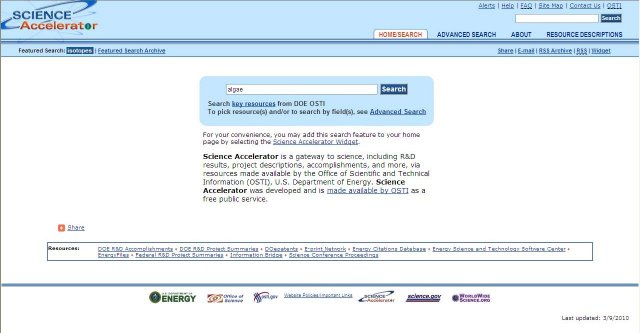
Figure 1: Default search screen
In this example, a simple search for algae is performed; there is a bar (Figure 2) that shows the progress of the search and a popup application that requests the researcher's permission (Figure 2) to add additional resources to the results list. The default operator for a basic search is AND, but it is possible to use OR, NOT, and phrase searching by enclosing the terms in quotation marks. An option not normally available on most search engines is the use of nested searching using parentheses (e.g., Global ((climate change) OR warming)). Truncation wild cards also available, which include an * for 0 plus characters and a ? for only one additional character.
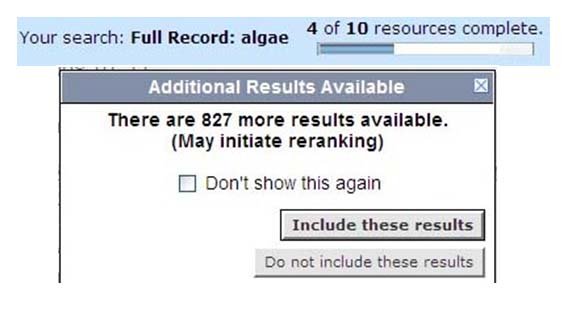
Figure 2: Progress bar and Message allowing the searcher to include additional results
The previous search yields 834 results. Fortunately, as seen in Figure 3 , the Science Accelerator provides the search screen with a box labeled "Refine Results," that allows the user to input additional terms, in this case, "biofuels" is used.

Figure 3: Search box for refining the search using additional terms
A refined search for algae and biofuels produces 21 results ranked in order of relevance as shown in Figure 4. EurekAlerts related to the search topic appear on the right hand side of the screen and clinking on the hyperlinked title will take the user directly to the full-text. The search box across the top allows the user to input more terms to narrow the search down further. Under the "Refine Results" search box, the "Sort by:" option allows the user to sort the results by rank, source, date, or title. The "Go to:" option will bring the results from the selected resource to the front of the results list. A button located directly below the search box allows the user to create an alert on the topic after they register and login. The column on the left had side of the screen is the Clusters menu with other topic and date options.
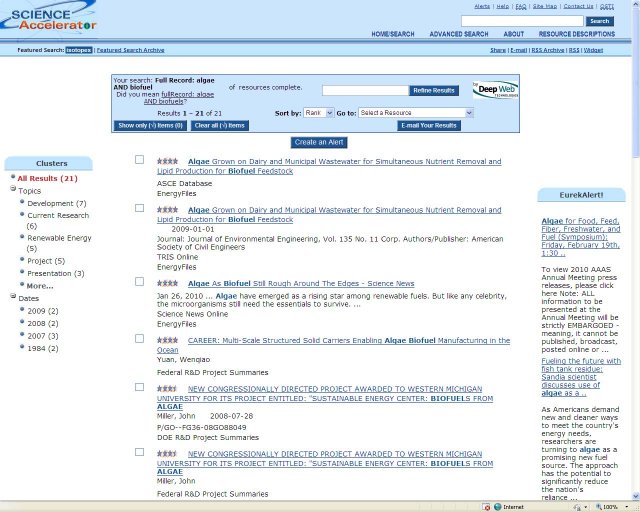
Figure 4: The results of a refine search for "algae AND biofuels."
Figure 5 is the record for the journal article entitled "Algae Grown on Dairy and municipal Wastewater for Simultaneous Nutrient Removal and Lipid Production for Biofuel Feedstock," listed in the results list. The link under "Availability" goes directly to the record for the journal, Journal of environmental engineering, which the article is published in, in OCLC web database World Cat. Libraries with World Cat subscriptions will be able to view and access any article linking software and interlibrary loan links that are available so the user can search their local online catalog or access the interlibrary loan systems to request the article.
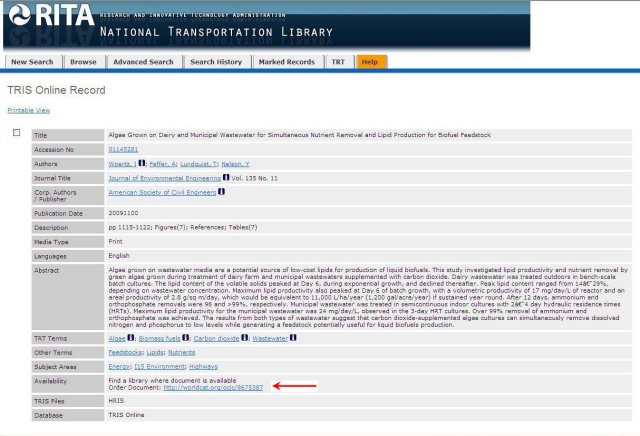
Figure 5: Record for a Journal article with a link to World Cat
Clicking on the title "Algae as Biofuel Still Rough Around the Edges" from the results list takes the user directly to the full-text (Figure 6), when full-text is available online.
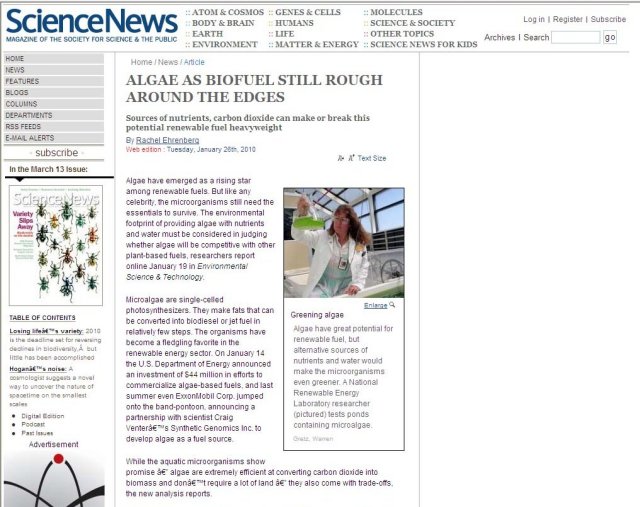
Figure 6: Full text for one of the entries in the results list
Under the Clusters tab to the right of the search results screen are two categories. The topics category appears to sort the results by subject and dates category sorts by year. However, the date section clearly does not include all 21 results available so limiting by date would be ill-advised. Several searches were performed to test this theory and it is clear that not all results yield dates readable by this function. Clicking one of topics listed to the right will narrow the results list to just articles covering that topic. For example, clicking on "Renewable Energy" limits the result list to five entries as seen in Figure 8. E-mail communication with Science Accelerator's Product Manger states that the topics for the clusters are from an analysis of the search results and the occurrence of words. Common stop words are excluded.
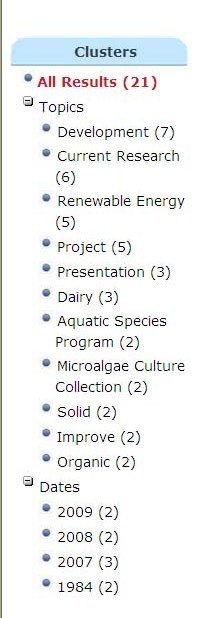
Figure 7: Refining options listed under the Clusters Tab
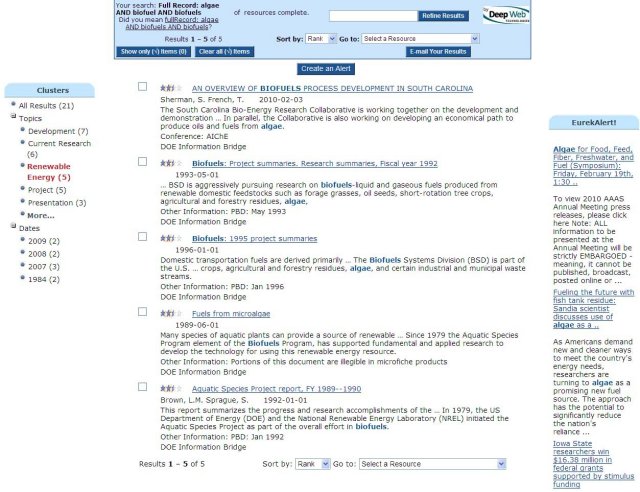
Figure 8: List of entries under "Renewable Energy."
The advanced search (Figure 9) is available for researchers looking for specific objects when they know the title and author's name. It allows the searcher to limit the search to a date range and select which sources available in Science Accelerator (as indicated at the beginning of this review) the search is done in. The "Resources" hyperlinks at the bottom of the advanced search screen will take the searcher to the home search page of that resource, so they can be searched individually.
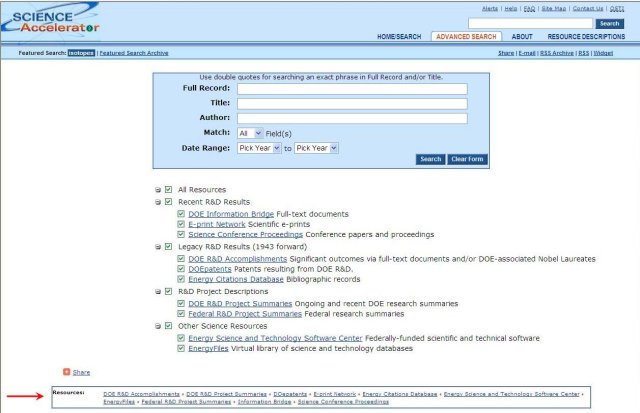
Figure 9: Advance search form for Science Accelerator
The Science Accelerator is an effective tool for keeping track of DOE projects, patents, and R&D in the area of energy. The basic search form is easy to use and provides an adequate means of developing a search topic and narrowing it down to get the desired results. It is focused in scope as it pertains to DOE projects, summaries, etc. only, but it is a useful tool for finding information in that specific subset. It can be used by researchers, graduates and undergraduates to keep track of updates, new developments, and research currently or previously funded by the Department of Energy.
| Previous | Contents | Next |
